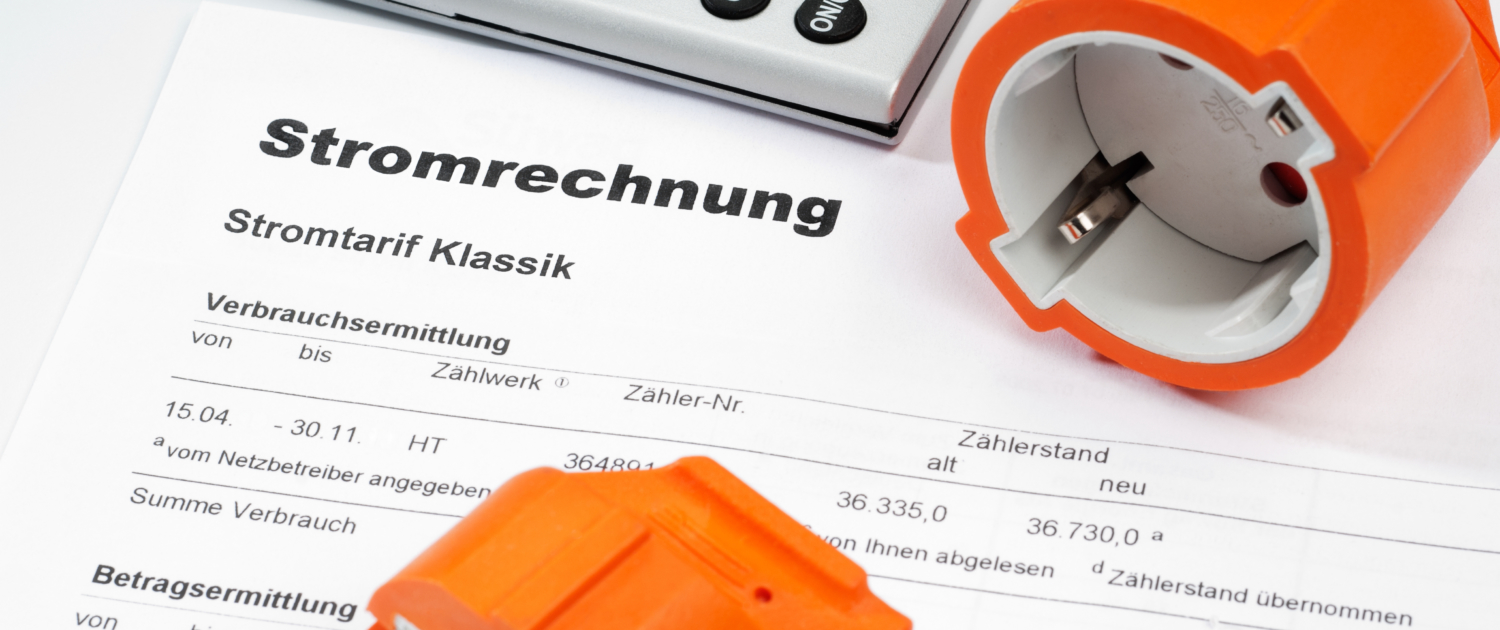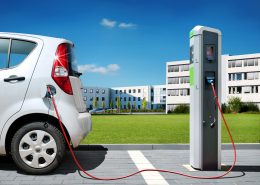Manipulation or assistance? How nudging influences our behaviour.
Does the behaviour of electricity customers change when they see on their bill how much electricity they use compared to their neighbours? A US study has shown: Households can be persuaded to save energy in this way. This additional information on the bill is an example of nudging. Nudging is a method of gently nudging people to change their behaviour without coercion.
In order to meet the Paris climate goal (keeping global warming below 2 degrees by 2050), greenhouse gas emissions must be drastically reduced. The International Energy Agency (IEA) estimates that about two-thirds of the emissions that need to be reduced to reach the net zero target will require active consumer participation.
There are a number of ways to achieve behavioural change: You can run information campaigns, use incentives or bans, or nudging. Wikipedia describes nudging (synonym for stimulating, guiding, shaping) as a method of behavioural economics that attempts to influence people's behaviour in a predictable way, but without resorting to bans, bids or economic incentives.
Nudges can be information - such as that on the energy label or, as mentioned, the information on electricity consumption on the bill. In the USA, many households now receive electricity bills that compare their energy consumption with that of their neighbours. An experiment showed that this nudge works. Households that consume a lot of energy can be persuaded to bring their consumption closer to the average consumption - with the effect that the total energy consumption also decreases.
The default nudge
Another type of nudge is often used - the so-called default setting. There are also examples of this in the energy sector. Electricity suppliers offer their customers renewable electricity by default. Those who do not want this must actively change this (opt-out).
Researchers at the Universities of Geneva and St. Gallen have investigated the effect of such nudges - as part of the Swiss Federal Office of Energy's Energy, Economy and Society research programme. Energeiaplus asked Professor Tobias Brosch and Dr Ulf Hahnel from the Consumer Decision and Sustainable Behavior Lab at the University of Geneva how nudging works in the energy sector.
Energeiaplus: At the end of the 1980s, former Federal Councillor Adolf Ogi showed Switzerland how to boil eggs in an energy-savingway. Adolf Ogi thus became the nation's egg cooker and the Ogi method achieved cult status. Would that be called nudging today?

Tobias Brosch heads the Consumer Decision and Sustainable Behavior Lab at the University of Geneva Image: University of Geneva
Using prominent behavioral models, or those perceived as particularly competent, does indeed fall into the category of nudging. Social psychological research has shown that our reaction to a news item is highly dependent on our evaluation of the information source. Thus, we are influenced by the perceived authority or competence of the messenger, but also by the feelings we have towards the messenger.
In its modelling, the IEA has found that consumer behaviour is central to achieving the net zero target. Can we nudge ourselves towards the energy transition?
Nudges can certainly play a role in reducing our energy consumption and encouraging the uptake of efficient technologies. They will not be the sole solution to bring about the energy transition, but they can usefully complement classic approaches to behaviour change such as information campaigns, financial incentives and bans as additional means.

Ulf Hahnel conducts research at the Consumer Decision and Sustainable Decision Lab at the University of Geneva. Image: University of Geneva
Which nudges are particularly effective?
Nudges that can be easily scaled up, i.e. quickly communicated to many consumers, are particularly effective in achieving behavioural changes quickly and efficiently. For example, the default nudge, where a certain choice option is given as a default setting (such as default settings for green electricity), or attribute translations, where a not so well understood unit is translated into a more understandable one (for example, the gasoline equivalent for electric cars, which simplifies the understanding of the consumption differences between electric cars and gasoline cars).
Let's take a closer look at some of the nudges you've explored. What is more effective in working towards getting people to buy green electricity? If they have to actively choose green power (opt-in) or if that option is already provided as a default?
Defaults are among the most effective nudge we know of. In 2015, a study in German households showed that about 10% of households would actively choose green electricity, while a default setting would increase the share of green electricity up to 70% of households.
Various mechanisms for this effect are discussed in the literature. One reason for the strong influence of default settings is that consumers understand the default choice as a recommendation and are inclined to follow it.
Keyword electromobility: When buying an electric car, the range is a big issue. Many fear that they will not be able to cover long distances with the e-car without problems. You have investigated this "range anxiety". What is your finding?
In a recent study, Mario Herberz and we were able to show that motorists underestimate the proportion of their journeys that an electric car can cover by around 30%. Most drivers therefore think that they can "manage" fewer journeys with an electric car than is actually the case. The stronger this perceived misconception, the less people intend to buy an electric car, or only if the vehicle's battery is oversized.
We were able to show that information about how many of your personal annual trips can be covered by an electric car can reduce the range anxiety you mentioned and increase your willingness to buy electric cars. Information on personal range coverage is relatively easy to collect and could be presented in future on online vehicle purchasing portals, for example.
So with a "push" you can motivate people to buy an e-car?
Yes, by helping drivers to perceive the features and possibilities of an electric car in an unbiased way. Since the share of electric cars is still relatively low, drivers can still rely little on personal experience when making a purchase decision. Information transfer is therefore all the more important. As we were able to show, the range anxiety of a large number of drivers is unfounded and can be reduced by simple information.
Nudges can therefore get people to do what you want them to do without telling them what to do. The whole thing is not without controversy - especially when the state uses such nudges. There is talk of manipulation, paternalism. It is said to play with the bad conscience, to create pressure. Are nudges cheap psychological tricks?
Such a generalization does not do justice to nudging, but when nudges are introduced, they should be examined individually and it should be ensured that the nudges are transparent and that citizens retain their freedom of choice. This is particularly important as nudges can vary widely. Our approach is to support citizens in their decisions, not to exploit their weaknesses.
Take, for example, the intervention on electric cars mentioned above. As our studies showed, drivers underestimate the real-world possibilities of an electric car. We would not consider reducing this bias through personalized information as manipulation at all, but as a useful decision support.
Where do you see the limits of nudging?
When citizens are restricted in their freedom of choice or nudged to make decisions that are associated with personal or societal disadvantages. The use of a well-functioning nudge that nudges a family to buy a PV system that they cannot actually afford is questionable.
Where does gentle nudging not work?
In particular, citizens who already have strong preferences on a particular issue are less likely to be swayed by nudges. In the green power example above, people with very strong environmental values, as well as people who are very strongly opposed to green power for various reasons, are less influenced by the nudge. This underlines that nudges do not undermine free will, but that one can always decide congruently with one's needs and values.
Surveys, studies, prevention and awareness campaigns can serve as nudges. Do we need more transparency?
Transparency is very important, especially when it comes to the acceptance of nudges. Studies have shown that citizens tend to support nudges as long as they serve social goals, are implemented by trustworthy bodies and the intervention is made transparent.
What needs to be taken into account when such interventions are used by the state?
The state should have scientific support for the introduction of interventions. Introducing a nudge "blindly" can lead to the intervention not being effective or even having opposite effects. Care must also be taken to ensure that the nudge guarantees citizens' freedom of choice and that certain population groups are not disadvantaged by the intervention.
Text and interview: Brigitte Mader, Communication Federal Office of Energy
 shutterstock
shutterstock
 ShutterstockDes données ouvertes mieux adaptées à une société digitale
ShutterstockDes données ouvertes mieux adaptées à une société digitale  Solarbildung Schweiz – 10-Punkteprogramm als Eckpfeiler des Umsetzungskonzepts
Solarbildung Schweiz – 10-Punkteprogramm als Eckpfeiler des Umsetzungskonzepts  OFENUn quartier prêt pour les futurs défis
OFENUn quartier prêt pour les futurs défis  FotaliaEvolution rapide pour le marché des voitures à haute efficacité énergétique
FotaliaEvolution rapide pour le marché des voitures à haute efficacité énergétique 
 keystone
keystone Shutterstock
Shutterstock
Dein Kommentar
An Diskussion beteiligen?Hinterlassen Sie uns Ihren Kommentar!